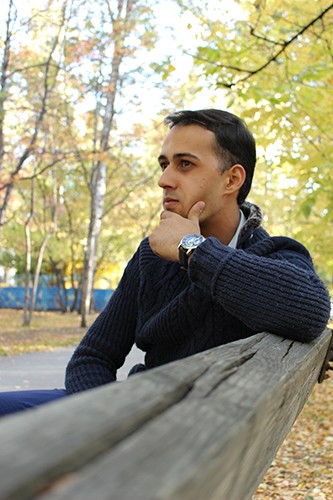Speeches Shim

Lautaro, Sarvar, and Ekaterina have one thing in common – their desire to help people with tuberculosis (TB) to get the care and treatment that they need. Each of them has personal experience with TB – either in their families or having contracted it themselves.
Lautaro Palmer recalls the time his uncle was infected and did not want to seek treatment. Lautaro took care of his uncle, seeing him through the whole process from diagnosis to successful completion of treatment. “Only when you face such a problem, you do realize how important it is to solve it,” says Lautaro.
Like thousands of other labor migrants, Sarvar Otajonov was likely infected with TB while working as a migrant laborer in Russia. He did not seek treatment for a long time after he returned home – not until he felt too sick to work. Fortunately, with the care of the medical staff at a local TB hospital and USAID TB volunteers, who provided him with psychological and social support, Sarvar was able to overcome the disease. Now, he is a volunteer, providing support, advice, consultation, and guidance to others affected by TB. Among those that Sarvar helps with treatment adherence, are migrants and women who might have stopped treatment due to stigma, discrimination, or family considerations.
Ekaterina has gone through TB treatment several times. Her latest treatment for extensively drug resistant TB (XDR-TB) was the longest and the most complicated. It was a monumental struggle for her, one she admits she could not have done without the support of her family and friends. Ekaterina recalls how painful it was when she observed other women suffering from TB who had no support and understanding even from close family members. She was looking for opportunities to support such women and was always saying, “Never lose your hope, find the reason and desire to live, and you will surely win the fight against the disease.”
These stories, and many others like them, of the struggle and support needed to defeat TB, should be heard by the entire community by decision makers.
With support of the USAID Eliminating Tuberculosis in Central Asia activity, the National TB program (NTP) in Uzbekistan has initiated the establishment of a new Coalition of People Affected by TB. The Coalition will participate in the development of the national TB strategy and be the voice of those affected by TB in health policy decision-making. This is a new development in Uzbekistan, as policy making has traditionally been solely the responsibility of the Government.
Lautaro, Sarvar, and Ekaterina are the first volunteers interested in becoming the founding members of the Coalition. They are now participating in the development of the National Strategic Plan on TB Control and Uzbekistan’s application to the Global Fund for TB funding. Among their contributions to these strategy development processes were specific inputs on enhancing the psychological and social support for individuals with TB and increased attention to the impact of COVID-19 on TB treatment - important issues that are often overlooked in government strategy. The issues addressed by volunteers are critical to treatment adherence and success, not to mention the overall well-being of people affected by TB.
In the past, people with TB had no opportunity to contribute to TB policymaking. With support from the NTP, USAID, and the dedication of people like Lautaro, Sarvar, and Ekaterina, this has changed. The Coalition is blazing a new path, where government and civil society can come together to craft policy and strategy that better addresses the needs of TB patients and those at risk.

Comment
Make a general inquiry or suggest an improvement.